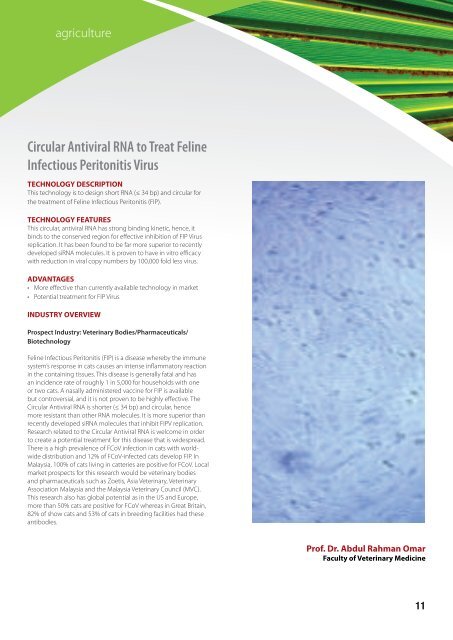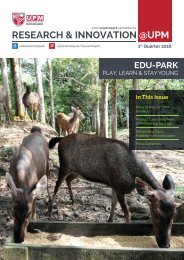Innovation directory 4th edition
You also want an ePaper? Increase the reach of your titles
YUMPU automatically turns print PDFs into web optimized ePapers that Google loves.
agriculture<br />
Circular Antiviral RNA to Treat Feline<br />
Infectious Peritonitis Virus<br />
TECHNOLOGY DESCRIPTION<br />
This technology is to design short RNA (≤ 34 bp) and circular for<br />
the treatment of Feline Infectious Peritonitis (FIP).<br />
TECHNOLOGY FEATURES<br />
This circular, antiviral RNA has strong binding kinetic, hence, it<br />
binds to the conserved region for effective inhibition of FIP Virus<br />
replication. It has been found to be far more superior to recently<br />
developed siRNA molecules. It is proven to have in vitro efficacy<br />
with reduction in viral copy numbers by 100,000 fold less virus.<br />
ADVANTAGES<br />
• More effective than currently available technology in market<br />
• Potential treatment for FIP Virus<br />
INDUSTRY OVERVIEW<br />
Prospect Industry: Veterinary Bodies/Pharmaceuticals/<br />
Biotechnology<br />
Feline Infectious Peritonitis (FIP) is a disease whereby the immune<br />
system’s response in cats causes an intense inflammatory reaction<br />
in the containing tissues. This disease is generally fatal and has<br />
an incidence rate of roughly 1 in 5,000 for households with one<br />
or two cats. A nasally administered vaccine for FIP is available<br />
but controversial, and it is not proven to be highly effective. The<br />
Circular Antiviral RNA is shorter (≤ 34 bp) and circular, hence<br />
more resistant than other RNA molecules. It is more superior than<br />
recently developed siRNA molecules that inhibit FIPV replication.<br />
Research related to the Circular Antiviral RNA is welcome in order<br />
to create a potential treatment for this disease that is widespread.<br />
There is a high prevalence of FCoV infection in cats with worldwide<br />
distribution and 12% of FCoV-infected cats develop FIP. In<br />
Malaysia, 100% of cats living in catteries are positive for FCoV. Local<br />
market prospects for this research would be veterinary bodies<br />
and pharmaceuticals such as Zoetis, Asia Veterinary, Veterinary<br />
Association Malaysia and the Malaysia Veterinary Council (MVC).<br />
This research also has global potential as in the US and Europe,<br />
more than 50% cats are positive for FCoV whereas in Great Britain,<br />
82% of show cats and 53% of cats in breeding facilities had these<br />
antibodies.<br />
Prof. Dr. Abdul Rahman Omar<br />
Faculty of Veterinary Medicine<br />
11















